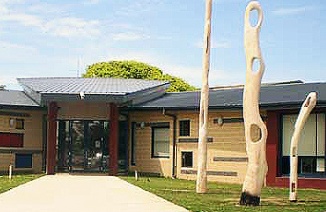
RosebudSecondaryCollege
Rosebud Secondary College
245 Eastbourne Road, Rosebud, Victoria 3939
In 1943, as the result of a deputation from the people of Flinders Shire, the Minister of Public Instruction, Mr. T. Hollway, agreed that a multi-purpose school on the Mornington Peninsula was necessary, and inspected the present site in Boneo Road, which was thought to be the best position. Correspondence between the Shire Council and the Minister flowed back and forth for a year and a half until the Minister was requested to receive another deputation, but he stated that he could see no good purpose in receiving it, as the land for building had been' acquired and the construction of the building was given a high priority in the post-war plans. A year and a half later in November, 1946, it was discovered that the land had not been purchased at all. The new Minister, Mr. F. Field, looked into the matter as a result of urgent representations from the Shire, and the 15 acres of land in Boneo Road were purchased in February, 1947 for about £12 an acre. Serviced quarter acre blocks in the area now sell at around $10,000. The Shire Council pressed for the immediate construction of the building, but because of the need for consolidated schools throughout the State, including Red Hill, nothing could be done.
Like many other schools in rapidly growing areas, our buildings have developed in a rather piecemeal fashion. They undoubtedly represent the most disappointing feature of the school's physical development, and the problems have not diminished with the years.
The school opened in 1954 with the Timber and Bristol Wings, consisting of thirteen classrooms in all, with a ramp open at one side connecting them. Although the buildings were unkindly labelled "chicken coops", most were happy enough with them at first, especially since many people mistakenly believed they were only temporary constructions.
Early restrictions on both working space and the curriculum were temporarily relieved in late 1955 with the construction of the Domestic Arts Wing, Offices, Staffroom and the practice flat. Two years later, space was again scarce, causing the laundry and some storerooms to be used for classes. The Headmaster's original office, which had been converted into a much needed sick bay, became the main form 6 classroom. The situation improved after the completion of the Manual Arts Wing in 1959. Mr. Hudson's predictions of a new accommodation crisis by 1962 proved true enough, but repeated requests for portable classrooms brought only benevolent pleas to have patience. We may indeed have been fortunate to have avoided portables at that stage. The Headmaster's persistence was at last rewarded when a new wing with four small classrooms was built in 1964. A well equipped science block, erected in 1965, ensured a brief period of comfort. This was the last group of permanent classrooms to be built at the school.
1967 saw the completion of the best building, the Assembly Hall, but soon after we began to receive the first of the ugly, inefficient portable classrooms. Bat tennis courts, a netball court, a volleyball court and much general playing space has been gobbled up by these so-called "temporary' classrooms. The fourteenth portable arrived late in 1978.